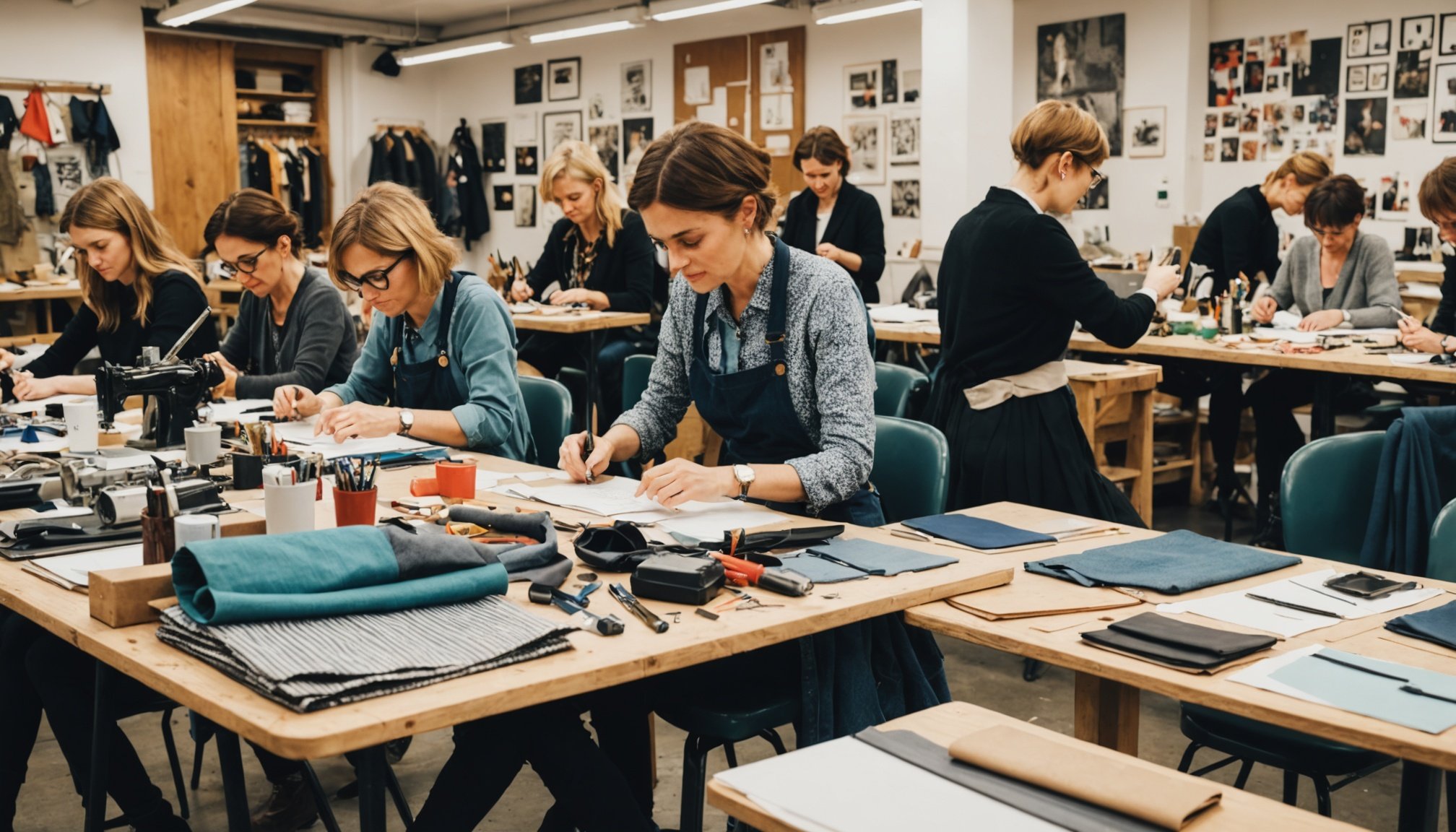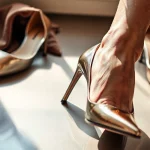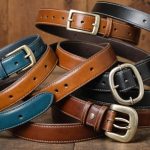Overview of Fashion Upcycling Workshops in London
Fashion upcycling is an innovative approach within the fashion industry, focusing on transforming old garments into stylish new pieces. This eco-friendly practice is significant in promoting sustainability by reducing waste and extending the life cycle of existing materials. In London, the trend towards fashion upcycling has steadily gained popularity as consumers become more environmentally conscious.
The rise of fashion upcycling is linked to an increased awareness of sustainability and the negative impacts of fast fashion. By participating in workshops in London, individuals can engage directly with sustainable fashion principles. These workshops offer hands-on experiences, where participants learn how to repurpose clothing using creative techniques, fostering both individual expression and environmental responsibility.
In parallel : Discover the Ultimate Spots for Unique Vintage Hats and Headpieces Across the UK!
There are numerous benefits to joining these upcycling workshops. They not only enhance one’s eco-friendly fashion skills but also provide a platform for creativity while addressing consumer sustainability concerns. Furthermore, attendees can connect with like-minded individuals, cultivating a community passionate about sustainable practices. Whether you’re looking to refresh your wardrobe sustainably or simply broaden your creative horizons, fashion upcycling workshops present an accessible and practical solution. By adopting these principles, anyone can contribute positively to the environment and partake in the vibrant world of eco-friendly fashion.
Top-Rated Fashion Upcycling Workshops
In London, fashion education is seeing a rise in popularity, especially for those interested in upcycling. These top-rated classes provide hands-on experience tailored for fashion enthusiasts.
Additional reading : Top Spots to Shop for Artisan Women”s Leather Belts in the UK
Workshop 1: Stitched Studio, Shoreditch
Stitched Studio, located in the vibrant area of Shoreditch, is renowned for being among the best upcycling workshops in the city. Its courses are led by Emma Collins, a designer with over 10 years of experience. Her expertise in sustainable fashion has influenced many budding designers. Classes are available weekly, catering to beginners through to advanced learners. Students particularly enjoy her approach to teaching practical skills within upcycling.
Workshop 2: Revamp Academy, Camden
Revamp Academy, nestled in Camden, offers some of the top-rated classes due to its innovative approach. Founder Tom Monroe, with a background in textile design, brings a wealth of knowledge. Weekly, Monroe holds workshops focusing on transforming outdated garments into trendy pieces. Participants praise his creativity and the academy’s relaxed, inspiring atmosphere.
Workshop 3: Recycle Runway, Notting Hill
At Recycle Runway in Notting Hill, participants engage with fashion education through interactive sessions. Jane Patel, who heads the classes, is a former fashion industry professional turned eco-warrior. Classes occur bi-weekly, blending theoretical knowledge with practical applications. Client testimonials often highlight the transformative experience and supportive environment provided.
Unique Offerings and Experiences
When it comes to unique fashion experiences, one standout feature is the specialized upcycling classes or themed workshops. These sessions are designed not only to promote sustainability but also to unleash creativity. Participants can transform their old garments into new, stylish pieces that reflect their personal taste. This hands-on approach offers a tangible way to engage with the principles of sustainable fashion, allowing individuals to leave with something both meaningful and fashionable.
One of the enriching elements of these creative workshops is the collaboration with local artists or designers. This cooperative effort fosters a sense of community and innovation, bringing fresh ideas and perspectives into the workshops. Participants can gain insights directly from established professionals, helping to refine their own artistic skills while also expanding their understanding of the fashion industry’s current trends.
These workshops don’t just focus on creativity; they also serve as valuable opportunities for community engagement and networking. Attendees often connect with like-minded individuals, forming relationships that can lead to future collaborations or projects. These networking opportunities are an integral part of the workshops, offering participants a platform to exchange ideas and build a supportive community around their shared interest in fashion and creativity.
Costs and Accessibility
When it comes to workshop pricing in London, expect a diverse range of costs tailored to various upcycling classes. On average, these affordable upcycling classes range from £20 to £50 per session, depending on the materials provided and the intricacy of the project. For those with a limited budget, look for community centres or non-profit organisations offering discounts or sliding scale pricing to make these creative endeavours more accessible.
Finding budget-friendly options is achievable by exploring online platforms or local event listings. Keep an eye on social media groups focused on upcycling, as they often share information about free or low-cost workshops. Additionally, subscribing to newsletters from arts and crafts stores can unveil special promotions or upcoming events with reduced prices.
Accessibility in London extends beyond just financial considerations. Many workshops strive to accommodate participants with diverse needs, including those with physical, sensory, or cognitive challenges. To ensure a pleasant and inclusive experience, check if the venue offers facilities such as wheelchair ramps, sign language interpreters, or sensory-friendly sessions. Remember, it’s always wise to contact the organiser directly to discuss specific requirements and confirm tailored support is available. Embrace the creative journey with confidence, knowing there are options to suit your circumstances.
Beginner’s Guide to Fashion Upcycling
Embarking on your fashion upcycling journey is both rewarding and eco-friendly. Understanding some basic upcycling tips for beginners can set you on the path to creating a sustainable wardrobe. Start with essential techniques and tools, such as fabric scissors, sewing machines, and needles. Armed with these, you’ll be ready to transform old clothes into avant-garde fashion pieces.
For those new to upcycling, begin with easy DIY projects. A sustainable fashion guide might advise starting by transforming a worn-out t-shirt into a trendy tote bag, or turning jeans into a stylish vest. Each project helps build your skills and improve your creativity.
If you’re seeking further education and motivation, countless resources are available. Websites and online tutorials offer a treasure trove of inspiration for your upcycling journey. Books dedicated to sustainable fashion also provide detailed instructions and a spectrum of ideas to expand your repertoire of DIY fashion ideas.
Exploring sustainable fashion doesn’t merely extend the life of clothing; it fosters a deeper appreciation for the craftsmanship in each piece. By adapting these upcycling tips for beginners, anyone can contribute towards a more sustainable future while cultivating their unique sense of style.
Environmental Impact of Fashion Upcycling
Fashion upcycling significantly contributes to sustainable fashion impact by decreasing waste and promoting resource efficiency. In an era where eco-conscious living is becoming paramount, upcycling offers vital environmental benefits. For instance, it reduces landfill waste, minimising the carbon footprint associated with textile disposal. This approach repurposes materials that would otherwise be discarded, transforming them into valuable products and cutting down on the demand for virgin resources.
Research highlights that upcycling can reduce water consumption and pollution, as it often bypasses energy-intensive manufacturing processes. According to a study by the Global Fashion Agenda, the fashion industry could cut emissions by 44% through sustainable practices, which include upcycling. Individual contributions play a crucial role in bolstering the circular fashion economy. Each piece of clothing upcycled is a step towards mitigating the environmental costs of fast fashion.
Eco-conscious living encourages consumers to embrace upcycling, fostering a culture of reuse and innovation. Furthermore, upcycled fashion is not only environmentally friendly but allows for unique self-expression, making it appealing to a broader audience. As more individuals engage in these practices, the collective impact becomes more pronounced, reinforcing the benefits of eco-conscious, sustainable fashion choices.











